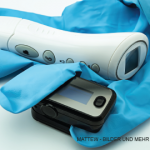Another inflammatory bone disorder, Majeed syndrome, is an autosomal recessive disease attributed to defects in the LPIN2 gene. Patients present with recurrent fever, recurrent CRMO, congenital dyserythropoietic anemia (CDA), and Sweet syndrome.
Cherubism is an autosomal dominant disease that generally presents at age three or four years. There is symmetric jaw swelling and radiolucent cystic bone lesions, Dr. Ferguson said. Loss of bone in the mandible that is replaced by fibrous tissue leads to the “cherubic” appearance.
According to Dr. Ferguson, the inflammatory bone disorders are rare and have no known triggers, but a genetic component has been identified. Better understanding of these diseases, as well as the genetic mutations responsible, “may teach us something” about psoriasis, Chron’s disease, rheumatoid arthritis, and other inflammatory diseases, she said.
Genetic Disorder of Complement
John Atkinson, MD, professor of molecular biology at the Washington University School of Medicine in St. Louis, said that genetic disorders of complement are the “scourges of a dysfunctional immune system.”
The complement system is at the center of the host response to pathogens. Therefore, patients with disorders of complement can be susceptible to recurrent infections such as sinopulmonary infections, bacteremia, and meningitis. Some of the pathogens that may be involved are Streptococcus pneumoniae, Hemophilus influenzae type B, and Neisseria meningitidis.
Autoimmune diseases, such as systemic lupus erythematosus (SLE), can develop due to inherited deficiencies in the complement system.
One disorder of the complement system is hemolytic uremic syndrome, in which the endothelium is damaged and thrombosis occurs, along with extensive damage to the kidney. About 25% of children die acutely, and 25% have relapsing disease.
Researchers involved in PROMISSE, a prospective, observational study in pregnancy in SLE, reported at the ACR/ARHP meeting that the genetic variants linked with preeclampsia in women with SLE or antiphospholipid syndrome (APS) are in complement regulatory proteins.1
These mutations in complement regulatory proteins were present in 18% of patients in the PROMISSE trial who had preeclampsia. Dr. Atkinson said that this study underscores the importance of complement in preeclampsia and gives insight about the mechanisms for increased risk for certain patients.
Kathy Holliman is a medical journalist based in New Jersey.
Reference
- Salmon JE, Fremeaux-Bacchi V, Liszewski MK, et al. Mutations in complement regulatory proteins predispose to preeclampsia in patients with lupus or antiphospholipid antibodies. #121. Presented at ACR/ARHP Scientific Meeting. Oct. 18, 2009. Philadelphia.

